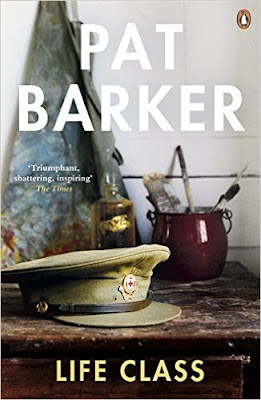The first novel in Pat Barker's new trilogy, Life Class is a memorable and compelling
story. Set In London in the spring of 1914, we follow the lives of a group of students at
the prestigious Slade School of Art, struggling to master life-drawing.
The
real life figure of Henry Tonks, described as "the most renowned and formidable teacher
of his generation" is wonderfully observed, as is that of Paul
Tarrant, the ‘odd man out’. As the only one not from a privileged background,
Tarrant finds the struggle to impress Professor Tonks harder than most and is not really
helped by his fellow students.
Pat Barker shows her award-winning mastery of story-telling
as World War I begins and everyone is forced to make difficult choices. Rather than fight at the front line, Paul Tarrant opts instead for harrowing work as a
Belgian Red Cross volunteer, tending the wounded, and of course returns as a changed man.
My favourite character is the intriguing artist Elinor Brooke,
a woman who refuses to follow convention. Elinor's attempted detachment from
the reality of the war seems hard to understand at first, but we must of course set
aside what we know. The ‘coming of age’ transformation is handled skilfully and
sensitively and I feel I have gained a deeper insight into what it must have been like to live through the first world war.
I particularly like the way the relationship between the main characters is explored through the exchange of letters, reminiscent of David Lodge in Changing Places, with an understated style that is more revealing than dialogue. I really enjoyed this book and have already started reading the second in the trilogy. Highly recommended.
Tony Riches
(Disclosure: The review copy of Life Class was provided by Penguin Random House UK.)
# # #
About the Author
Pat Barker was born in Thornaby-on-Tees and attended the London School of Economics. She has been a teacher of history and politics and lives in Durham, UK Pat Barker's books include Union Street (1982), winner of the 1983 Fawcett Prize, which has been filmed as "Stanley and Iris"; Blow Your House Down (1984); Liza's England (1986), The Man Who Wasn't There (1989) and the highly acclaimed Regeneration trilogy, comprising Regeneration, The Eye in The Door, winner of the 1993 Guardian Fiction Prize, and The Ghost Road, winner of the 1995 Booker Prize for Fiction.



This one is on my shelf, Tony. Enjoyed it very much and have lots of underlined passages. One of the many books I have on WWI.
ReplyDeleteHi Mary have you read the next one 'Toby's Room?' It answers the big question in 'Life Class' - and I'll be reviewing it here soon.
Delete